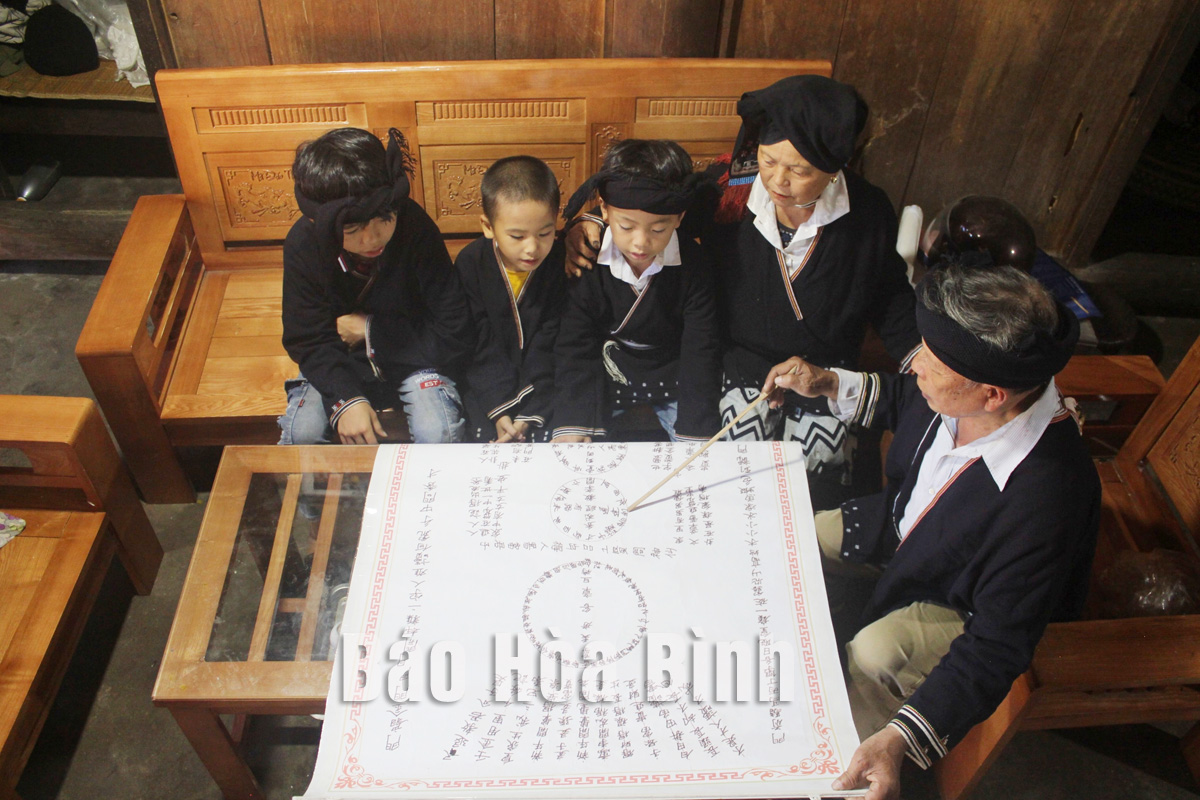
(HBO) – After years of overcoming difficulties and challenges to develop, Sung village of Cao Son commune, Da Bac district (Hoa Binh province), has made its name known in the tourism map of Vietnam. Tourism development has not only helped improve income but also created an impulse for local Dao Tien ethnic people to preserve and bring into play their traditional cultural values.
Ly Van Henh, a Sung villager of Cao Son commune (Da
Bac district), teaches the Nom - Dao script to children.
Located on Bieu Mountain – home to an ancient
forest, Sung hamlet boasts a cool and fresh atmosphere. Therefore, many
describe this place as an ideal getaway from the summer heat.
Affected by the COVID-19 pandemic for two years
(2020 - 2021), this village of Dao ethnic people has become an attractive
destination for domestic and international visitors since late 2022. Well-built
infrastructure, upgraded traditional-style houses, new services and,
especially, revitalised traditional crafts have made considerable changes to
Sung village.
Ly Van Henh, an elderly man teaching the
traditional Nom - Dao script of the Dao ethnic group, said his class has been
maintained for many years. By learning the script, young people can know how to
write the script and also gain a better understanding of their ethnic group’s
culture and moral standards, thereby helping uphold the good traditional
cultural values and develop community-based tourism as well.
Many traditional crafts of the Dao Tien people
have also been revived in Sung hamlet, including brocade weaving.
Ly Thi Thien, a woman in Sung village, said that
since local residents embarked on tourism, they have received assistance from a
project to set up a group of 12 brocade makers. The craft has helped them
produce not only beautiful clothes for their families but also an attractive
tourism product.
She perceived that tourism has given a facelift
to their village and improved their income. Her family and many others have
registered to provide accommodation services, and they hope to receive further
training in tourism skills and access concessional loans to create more
professional tourism services with higher economic profitability.
An official of the Da Bac culture and
information division said that preserving traditional culture is the key to
developing community-based tourism in the district. In Sung village, Da Bac
authorities have been helping locals improve their tourism skills as well as
recover, preserve, and bring into play the traditional culture of the Dao Tien
people in order to sustainably develop tourism and gain more economic benefits.
Aside from experiencing the traditional culture
of the Dao Tien people in Sung village, from here, visitors can go to explore
nearby destinations of Da Bac district such as Da Bia hamlet of Tien Phong
commune, Ke hamlet of Hien Luong commune, or Hoa Binh Lake that is dubbed "Ha
Long Bay on land”./.
As a land deeply intertwined with human history and Vietnam’s millennia-long journey of nation-building and defence, Hoa Binh is often revered for its epic tales and legends.
Residents of Hoa Binh boast a rich cultural identity, reflected in their unique language, traditional attire, customs, and folk melodies – described as "sweet as honey, clear as a mountain stream.”
Lac Son district’s Vu ban town held the 2025 Truong Kha temple festival on April 12–13 (the 15th–16th days of the third lunar month). Since its revival in 2019, the festival has been organised every three years, preserving valuable intangible heritage while meeting the community’s cultural and spiritual needs.
The clothing of women reflects the culture of the Muong, Thai, Tay, Dao, and Mong ethnic groups in the northern province of Hoa Binh.
Gongs hold a special place in the cultural and spiritual life of the Muong ethnic people in Hoa Binh province. More than musical instruments, they are an indispensable part of community rituals and collective memory, echoing through generations as a spiritual thread linking the past, present, and future.
Preserving and promoting the cultural values of the Muong ethnic group has become an urgent task in the current context, as many traditional values face the risk of fading away. This effort requires not only protecting the cultural identity but also eliminating outdated customs and developing a modern cultural lifestyle, contributing to sustainable values for the Muong community in Hoa Binh province.
The Muong ethnic culture, deeply rooted in Vietnam’s mountainous north, continues to be preserved and revitalised by dedicated individuals and communities determined to safeguard their ancestral identity.



